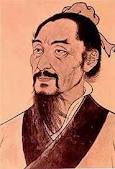Mohism
In Mohism, morality is not defined by tradition, but rather by a constant moral guide that parallels utilitarianism. Traditionalism is inconsistent, and humans need an extra-traditional, supernatural guide to identify which traditions are acceptable. The moral guide must then promote and encourage social behaviors that maximize general utility.
The social philosophy of Mohists is aggressive and enterprising. Their usual attitude is "If I can't do it, who can?" Not only do they discuss universal love and condemn aggression in the relationships among countries, families, and individuals, they also participate in various anti-war movements and social constructions. Mohist philosophers also strive to realize their ideal of an equal and harmonious world. From the perspective of a common citizen, they also contribute to the simple and conservative trend in Chinese philosophy by underlying thrift, prudence, and stopping waste.
Mao Zi (Mo Tzu, Mo Di)

Mozi is the representative of Mohist philosophy, and his ideas can be summed up in his famous "ten doctrines." He rationalized his political, social, and ethical thoughts with the help of the religious belief. Mozi's attitude towards science is also noteworthy. He not only gave his definitions on various notions in philosophy, but also made considerable contributions in establishing scientific methods, writing scientific teaching materials, and imparting scientific thoughts, resulting in the high level of Chinese research and development in very early ages.
After the death of Mozi, Mohism split into many different genres. Their common feature is that studied and researched on the book Mozi, based on which developed two basic trends: one stressing nature and science, and the other focusing on religious beliefs.
Mozi's ten doctrines:
1. Elevating the Worthy -- rulers should honor the worthy and employ the able rather than advance relatives and favorites.
2. Conforming to Superiors -- the people must be of one mind with their superiors so that unity is maintained.
3. Universal Love -- it is only by unconditional love that allows no special treatment for one's own kin that a secure society can be constructed.
4. Condemnation of Aggression -- warfare is always unprofitable, and if rulers could be taught this simple truth, there would be peace.
5. Moderation in Expenditures -- the state should expend its resources only on those things that bring benefit to the people.
6. Moderation in Funerals -- the sages had simple funerals and the Confucian doctrines advocating elaborate funerals and extended periods of mourning are falsifications of antiquity.
7. The Will of Heaven or Honoring Heaven -- the clearest standard in the world, which Mo Di would use as his square and compass.
8. Explaining the Spirits or Serving the Spirits -- a defense of the traditional belief in spirits and a refutation of Confucian skepticism.
9. Condemnation of Music -- a refutation of Confucian doctrines advocating elaborate musical performances as instruments of state ceremony.
10. Condemnation of Fate -- Fatalism fails to meet a series of justificatory criteria and so must be rejected. It is also a refutation of the fatalistic doctrines of some Confucian scholars.
Mohism was the only school of thought that could contend with Confucianism during the Warring States Period. Though the thought is not as longstanding or well established as Confucianism, its propositions like centralized political power, universal love, anti-war, anti-extravagance sociological notions, respect for heaven and gods, and indeterminism in religious thoughts, as well as Mozi's rational and practical attitude in science have all left their marks in Chinese philosophy and people's daily lives.